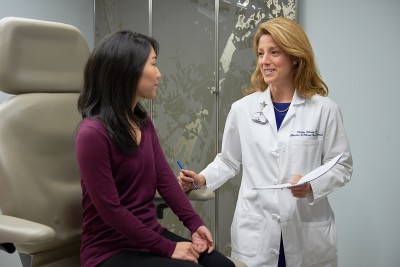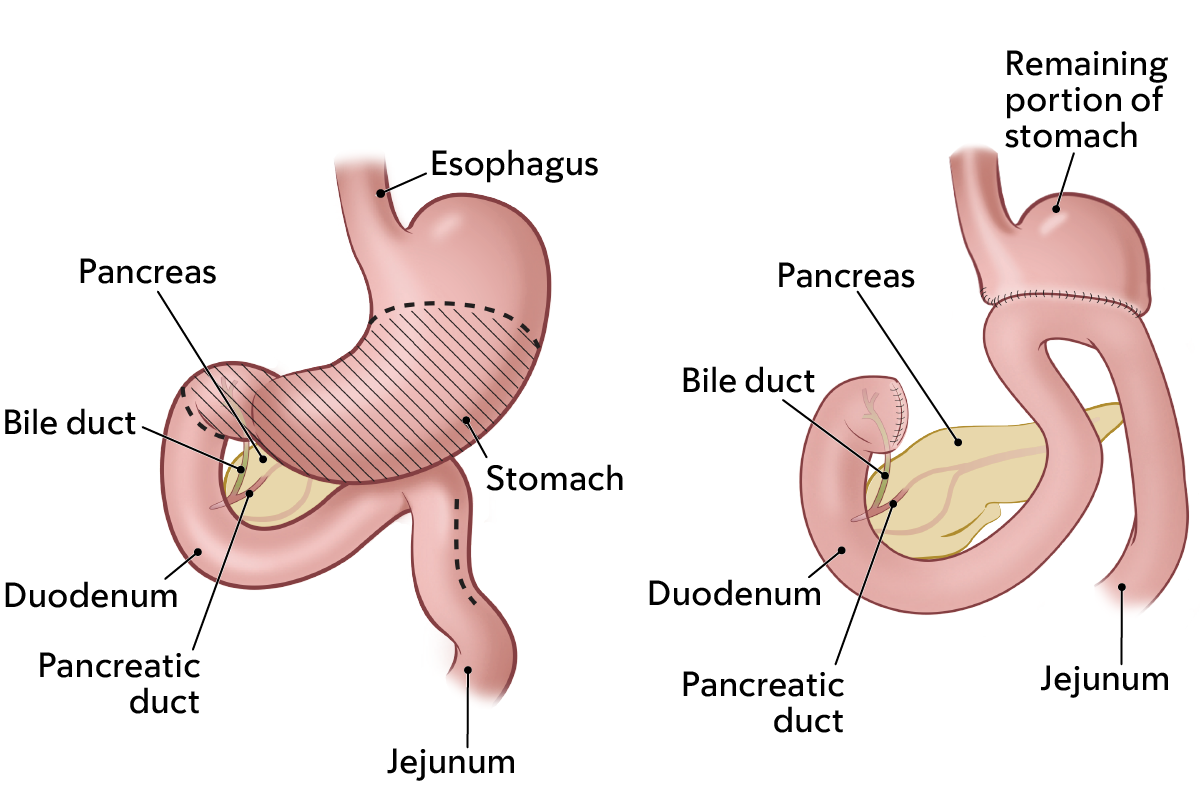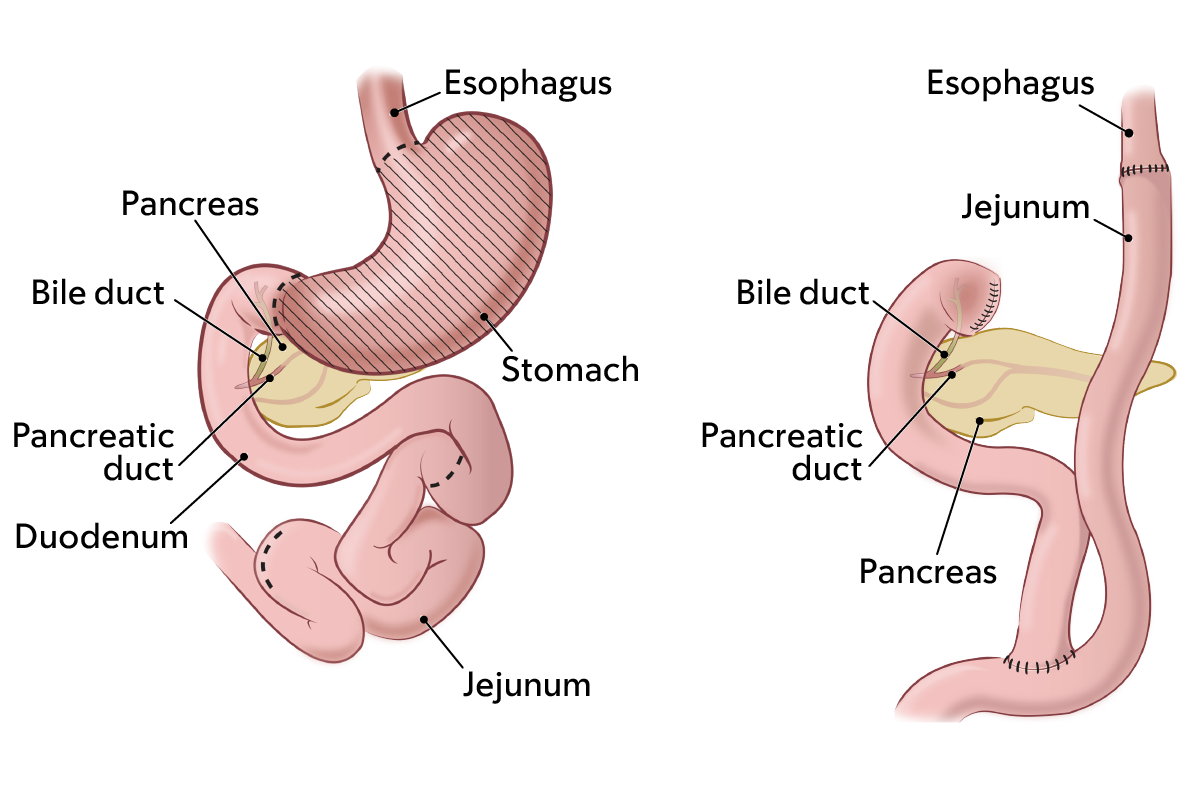
Stomach cancer surgery is a common treatment for stomach cancer. Surgery often is the best treatment for early-stage stomach cancer.
MSK surgeons are experts in surgery methods that do less harm to your body. The traditional method of surgery is called open surgery. This is when one long incision (cut) is made. Surgeons remove some or all of the stomach through the incision.
MSK’s stomach cancer experts often use minimally invasive surgery methods. This approach causes less harm, pain, and complications (problems). It also has a shorter recovery time.
Minimally invasive stomach cancer surgery
MSK gastric surgeons are leaders in using minimally invasive surgery methods to treat stomach cancers. The 2 minimally invasive surgery options are laparoscopy or robot-assisted surgery. These methods can help shorten your recovery time and lower your risk for complications.
What is laparoscopic surgery?
In laparoscopic surgery, your surgeon will make a small incision (cut). They will put a laparoscope through the incision. The laparoscope is a long, thin surgical tool with a video camera. It lets your surgeon see inside your body. Laparoscopic procedures can remove tumors or other tissue.
What is robot-assisted surgery?
Robot-assisted surgery is type of laparoscopic surgery that uses a robotic surgical tool. This tool lets your surgeon see better images, and the robot helps control the laparoscopic procedure. Your surgeon can see a console with a very detailed 3D image of the inside of your abdomen. They can control robotic arms to do the surgery.
Types of stomach cancer surgery
This section describes the types of stomach cancer surgery. They include:
Gastrojejunostomy (gastric bypass)
Stomach cancer gastrectomy
- Partial gastrectomy
- Distal gastrectomy
- Total gastrectomy
- Laparoscopic gastrectomy
- Proximal gastrectomy
What is a gastrojejunostomy?
A gastrojejunostomy (GAS-troh-JEH-joo-NOS-toh-mee)is also called a gastric bypass. This surgery connects part of the stomach to the jejunum.
The jejunum is the second part of your small intestine. Your duodenum is the first part of your small intestine. It’s attached to your stomach. A gastrojejunostomy connects your stomach to your jejunum instead. It bypasses the duodenum.
What is stomach cancer gastrectomy surgery?
A gastrectomy (ga-STREK-toh-mee) is surgery to remove part or all of your stomach. This surgery treats advanced or aggressive stomach cancer.

What are the different kinds of gastrectomies?
Partial gastrectomy is a procedure to remove the part of your stomach with cancer. It also removes nearby lymph nodes (called a lymphadenectomy) to check if they have cancer cells. Depending on the tumor’s location, your surgeon also may remove parts of other organs and tissues near the tumor.
Distal gastrectomy is a kind of partial gastrectomy. Your surgeon removes the lower part of your stomach called the antrum. They reconnect the rest of your stomach to your small intestines.

Total gastrectomy is a stomach cancer surgery to treat advanced cancer that has not spread to other organs. This surgery removes your whole stomach, nearby lymph nodes, and parts of your esophagus and small intestine. Your esophagus is reconnected to your small intestine so you can eat and swallow.
What is a laparoscopic gastrectomy?
Laparoscopy is a procedure that only uses small incisions and surgical instruments. A laparoscope is a thin, lighted tube with a video camera at its tip. During a laparoscopic gastrectomy, your surgeon removes the part of your stomach with cancer.
What is a proximal gastrectomy?
A proximal gastrectomy is a minimally invasive surgery. Your surgeon only removes the upper part of the stomach. It is less invasive surgery than a total gastrectomy. This type of gastrectomy can have fewer side effects and a faster recovery time, as well as better treatment results.
A tool that helps us plan your stomach surgery
MSK offers a gastric carcinoma nomogram. It’s an online tool that helps us predict how well you will do after stomach cancer surgery. The nomogram gives us information that helps your care team adjust your follow-up care.
The nomogram is hard to use and understand without help from your doctor. You need information from your treatment at MSK, including your diagnosis and treatment details. We strongly recommend you talk with your doctor before using the nomogram.
We’re available 24 hours a day, 7 days a week






